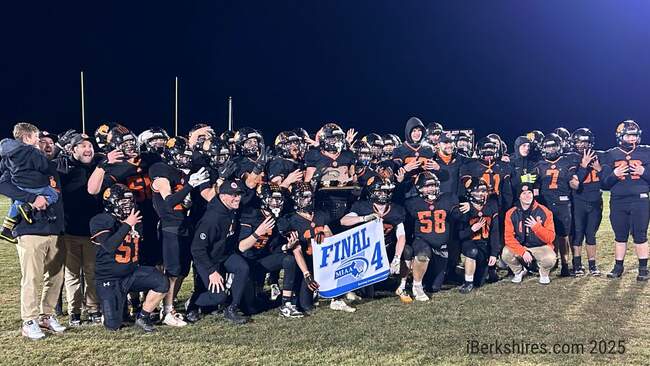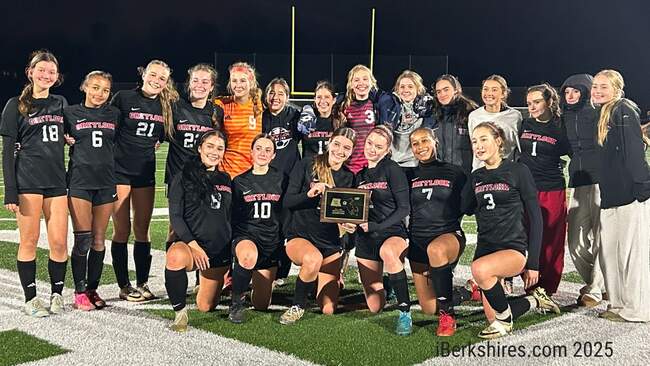
Wind Power Hearing Airs Concerns Over Turbines
 |
| Green Berkshires leader Eleanor Tillinghast takes issue with a state report's sunny data on wind power potential. |
"This is about giving away your freedom, this is about giving away your power," said self-proclaimed mountain man Rene Wendell, who manages Bartholomew's Cobble for The Trustess of Reservations and has walked the ridgelines being eyed for possible wind farms. The bill would "streamline permitting," he said. "Those two words should never be in the same sentence."
The public hearing held by the state Executive Office of Environmental Affairs at Berkshire Community College was seeking input into an initiative to develop state lands for alternative energy uses. Prompted by the Green Jobs Act of 2008, the effort is also part of a state policy promoted by Gov. Deval Patrick to generate 2,000 megawatts of wind power by 2020.
A recent state report identified dozens of sites in Western Massachusetts that could be suitable. The state currently generates less than 7 MW and the county has two privately owned turbines, including Jiminy Peak Mountain Resort's Zephyr. Other projects, such as Hoosac Wind on Florida Mountain, have been in permitting limbo for years.
A bill before the Legislature, the Wind Energy Siting Reform Act, would create a state commission to set standards and streamline permitting to get those projects back on track. "High wind" towns would establish their own boards, comprised of representatives from existing permitting boards; appeals, however, would be determined by the state board.
 Dwayne Breger, division director for renewable energy development goes over findings for wind power in the state. |
Julie M. Hannum, a Sheffield selectman, gave the example of Daniel Shay's armed uprising against unjust taxation to remind the panel "that means local control is very, very important to us."
She said she had trouble imagining beautiful Washington Mountain top by turbines; on the other hand, Sheffield had been working with a manufacturing company worried about energy costs. Hannum suggested a combination of state and local oversight: "Please take a balanced approach."
Wind turbines have become a controversial issue in the rural Berkshires, forcing civic and environmental groups to weigh the impacts of turbines on the land against those of global warming. While the city of Pittsfield is eager to have Pittsfield State Forest evaluated as a potential site, Green Berkshires is waging war against wind farm projects.
Praise for Zephyr has been leavened by fears of 400-foot towering turbines littering the county's mountain ranges; damage to the wildlife habitats and residents' health and quality of life; exploitation of state lands held in the public trust for the benefit of private industry; and disruption of the scenic vistas that attract tourists so important to the area's economy.
Some people said no turbines should be built (one well-received suggestion was to spend the money to buy everyone a photovoltaic panel), others called for strict and transparent guidelines and greater local control.
Yet energy has become a pocketbook issue for businesses and residents alike.
"Just saying no is not a long-term viable option locally or nationally," said David Rooney, president of Berkshire Economic Development Corp. "We have to have an honest discussion on the environmental and economic options."
 Berkshire Chamber President Michael Supranowicz gives testimony on local energy needs. |
Giudice said it was an issue that people were passionate about. "It's part of the process. People come out and talk and listen to each other ... We know we need to talk to people and get their perspectives and weigh it."
The panel will reflect on the oral and written comments it has received from the Pittsfield hearing and an earlier one in Bourne, where another cluster of wind sites have been identified. "We'll be having a lot of discussion on what will be the next step. That's part of the democratic process."
Laura Dubester, co-director of the Center for Ecological Technology, urged a careful and thoughtful approach to place turbines in appropriate sites and preserve fragile state lands. The effects of climate change on the state's ecosystems was just as important to consider, she said.
"We want the outcome to be well-designed projects we feel good about," she said. But "the fear of too many should not be the basis for saying we can't have any."
Western Mass residents are encouraged to submit written comments on the wind-power intiative to Steven Clarke, Director of Wind Development, Massachusetts Department of Energy Resources, 100 Cambridge St., Suite 1020, Boston, MA 02114 or to Steven.clarke@state.ma.us.















